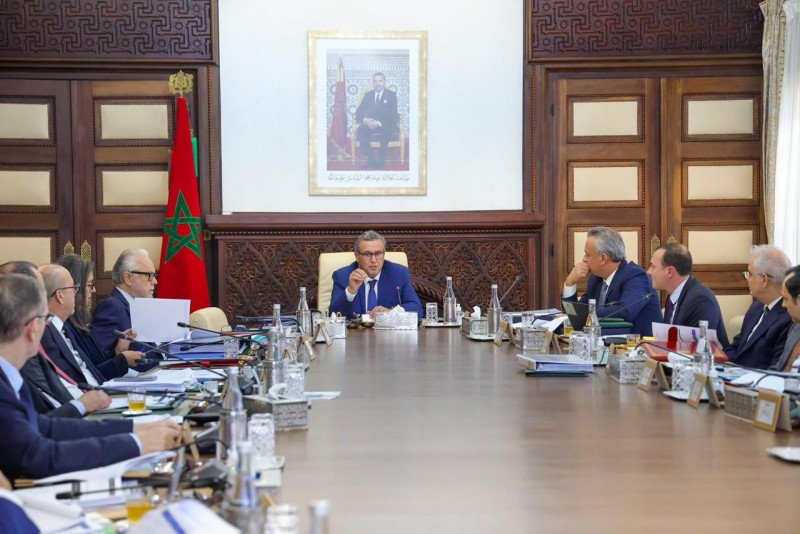Head of Government Aziz Akhannouch chaired today the sixth session of the National Investment Commission in Rabat, approving 56 investment projects valued at MAD 134 billion ($13.4 billion).
The session, operating under the framework of Morocco’s new Investment Charter implemented in March 2023, saw the approval of 52 projects under the basic investment support system, totaling MAD 113 billion ($11.3 billion).
Private investments accounted for MAD 24 billion ($2.4 billion) of this amount, with projections indicating the creation of 18,000 jobs – 10,000 direct and 8,000 indirect positions.
Four strategic investment projects, focusing on electric mobility, renewable energy industries, and seawater desalination, received special support status.
These projects, valued at MAD 21 billion ($2.1 billion), are set to generate approximately 10,000 jobs and will be implemented across three regions: Guelmim-Oued Noun, Tangier-Tetouan-Al Hoceima, and Casablanca-Settat.
The commission also granted “strategic status” to three additional projects worth MAD 14 billion ($1.4 billion) in the textile, electric mobility, and telecommunications sectors, expected to create 38,000 direct and indirect jobs.
The investments are distributed across 32 provinces in all 12 regions of Morocco. They cover key areas such as Fez, Meknes, Ifrane, M’diq-Fnideq, Larache, Al Hoceima, Laayoune, Boujdour, Khouribga, Essaouira, Safi, Taroudant, Errachidia, Nador, Dakhla, and Tan-Tan.
The approved projects cover 19 different sectors, with tourism emerging as the leading job creator, expected to generate 19% of total employment opportunities. This is followed by construction materials (18%), healthcare (15%), and the food industry (8%).
Other significant sectors include telecommunications, renewable energy, electrical manufacturing, railway industry, logistics services, chemical industries, automotive manufacturing, plastics, and offshore services.
During the session, the prime minister stated that the 2025 Finance Law reinforces the government’s priorities regarding private investment support and job creation.
The session, operating under the framework of Morocco’s new Investment Charter implemented in March 2023, saw the approval of 52 projects under the basic investment support system, totaling MAD 113 billion ($11.3 billion).
Private investments accounted for MAD 24 billion ($2.4 billion) of this amount, with projections indicating the creation of 18,000 jobs – 10,000 direct and 8,000 indirect positions.
Four strategic investment projects, focusing on electric mobility, renewable energy industries, and seawater desalination, received special support status.
These projects, valued at MAD 21 billion ($2.1 billion), are set to generate approximately 10,000 jobs and will be implemented across three regions: Guelmim-Oued Noun, Tangier-Tetouan-Al Hoceima, and Casablanca-Settat.
The commission also granted “strategic status” to three additional projects worth MAD 14 billion ($1.4 billion) in the textile, electric mobility, and telecommunications sectors, expected to create 38,000 direct and indirect jobs.
The investments are distributed across 32 provinces in all 12 regions of Morocco. They cover key areas such as Fez, Meknes, Ifrane, M’diq-Fnideq, Larache, Al Hoceima, Laayoune, Boujdour, Khouribga, Essaouira, Safi, Taroudant, Errachidia, Nador, Dakhla, and Tan-Tan.
The approved projects cover 19 different sectors, with tourism emerging as the leading job creator, expected to generate 19% of total employment opportunities. This is followed by construction materials (18%), healthcare (15%), and the food industry (8%).
Other significant sectors include telecommunications, renewable energy, electrical manufacturing, railway industry, logistics services, chemical industries, automotive manufacturing, plastics, and offshore services.
During the session, the prime minister stated that the 2025 Finance Law reinforces the government’s priorities regarding private investment support and job creation.
“Through four sessions in 2024, the National Investment Commission has achieved record figures in terms of approved investments and job creation potential,” Akhannouch remarked.
The meeting marks the sixth session since the implementation of Morocco’s new Investment Charter, which continues to operate under the guidance of King Mohammed VI’s directives aimed at boosting national economic development.
